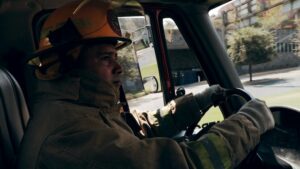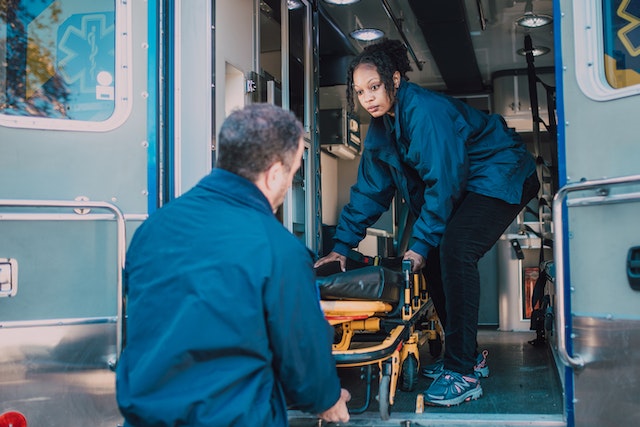Therapy Services for First Responders
Are You A First Responder Who’s Struggling To Find Peace In Life?
 Do you feel too stressed out from your job to relax and unwind when you get home?
Do you feel too stressed out from your job to relax and unwind when you get home?
Has the emotional wear and tear of your work led to strained relationships with others?
Are you tired of people telling you “This is what you signed up for” when you share your pain?
You got into this work for a reason: to serve and protect others. Although this makes you proud, the high-stakes environment of your job can take a huge toll on your mental health. The daily exposure to trauma after trauma can make you numb, desensitized, angry, and unable to sleep or eat well. As a result, you may be considering a therapist who works with first responders.
Your Job Could Put A Strain On Your Relationships And Home Life
Because of your hectic work schedule, you might find it hard to make time for family. And when you do have time for family, you may be too exhausted to fully engage with them. Eventually, this could lead to tension with your loved ones—they might see you as distant and uncaring.
Yet with your coworkers, things probably aren’t much better. Your officers may not respect you and the “suck it up” culture of your workplace may prevent you from sharing your feelings with others. What’s more, the broader community may have a hostile attitude towards the work you do. In this way, being a first responder can be a deeply lonely experience.
Thankfully, you don’t have to deal with your struggles alone. Whether you’re a nurse, firefighter, paramedic, police officer, or member of the military, West Wellness Counselling & Psychotherapy is here to help you manage the emotional toll of life as a first responder.
First Responders Have To Deal With Trauma On A Daily Basis
The numbers do not lie—roughly one in three first responders develop PTSD (1), and about 16 to 40 percent of them suffer from substance abuse (2). And given how many first responders don’t come forward about their struggles, it’s likely that the actual numbers are much higher.
Put simply, first responders have it tough. Many of them face daily exposure to trauma and have to deal with life-or-death situations on a regular basis. On top of that, there’s often a lack of support within their organizations and hostility among coworkers. Many first responders are told not to complain about trauma because “that’s what they signed up for.”
Sadly, this creates an atmosphere of shame. It leads first responders to bottle up their pain and suffer in silence, because they don’t want to risk being seen as weak or cowardly.
The truth is that it takes tremendous courage to admit you’re hurting. Counselling gives you a safe space to talk about your pain without fear of judgment or condescension. Our therapists are here to listen to you, validate you, and support you unreservedly.

Therapy Can Help First Responders Manage Their Stress More Effectively
Finding time to relax is hard, especially when you’re constantly on call for such high-stakes, dangerous work. At West Wellness Counselling & Psychotherapy, our goal is to provide you with time to unwind and give you new coping strategies for dealing with difficult emotions. We’ll help you manage the strain of shift work, process traumatic experiences, and build skills for navigating your relationships with others.
The struggles of first responders hit close to home for our practice—our therapists each have loved ones and family members who are first responders, so we understand many of the unique challenges they face. If you’re an emergency responder, active-duty military, or anyone else doing frontline work, we’re confident that our approach to therapy can provide the compassionate support you’ve been looking for.
 What To Expect In First Responder Therapy Sessions
What To Expect In First Responder Therapy Sessions
Together, we can work on processing difficult calls, reducing your stress, and improving your relationships. We’ll help you learn to be present in the moment instead of getting overwhelmed or stuck in negative thought patterns. This can be done through mindfulness skills like meditation, breathwork, and 5-4-3-2-1 exercises (i.e., five things you can see, four things you can touch, three things you can smell, etc.).
Additionally, we want to help you separate your work life from your home life. As a first responder, it’s so hard to relax, unwind, and be present for your loved ones when you get home from work. We will give you calming and grounding techniques that you can use when you’re off the job, allowing you to feel more engaged when you’re with your loved ones.
Tailoring Your Treatment Plan
Our therapists draw from a wide range of approaches to assist first responders. We often use Cognitive Behavioural Therapy (CBT), which is all about challenging distorted thought patterns and negative beliefs. CBT can help you work through the “suck it up” mentality that’s so prevalent in first responder organizations, allowing you to live with more self-compassion and self-acceptance.
To help first responders process and resolve trauma and PTSD, we may utilize Eye Movement Desensitization & Reprocessing (EMDR) therapy. When you’ve been traumatized, your mind feels like it’s still stuck in the past and the traumatic experience is still happening. EMDR uses bilateral exercises to reduce the emotional impact of trauma so that the past is no longer present in your life.
In the end, we believe that healing is possible with the right support. Being a first responder will never be an easy job, but when you have a place where you can safely talk through your issues with someone who supports you unconditionally, your mental health really can improve.
You May Have Some Questions About Therapy For First Responders…
How long do I need to be in therapy for?
The answer varies from client to client. While change doesn’t happen overnight, playing an active role in your therapeutic process will generally help you make progress faster. Healing takes time and setbacks are a natural part of the healing process, so it’s important to treat yourself with the same compassion that you would offer a good friend.
What experience do you have working with first responders?
One of us has a husband who’s a firefighter and the other has a son who’s a police officer. So although we are not first responders ourselves, we understand the challenges they face. This allows us to relate to first responders on a deeper level and help them work through all the complications of shift work, vicarious trauma, and other daily stressors.
What if my therapist judges me?
Our sessions are a judgment-free space—here, you can say whatever is on your mind without any fear of what others will think. We have a lot of experience working in the mental health field and we know that the traumas of first responders are legitimate. Instead of judging you, we’ll normalize what you’re going through so that you know you’re not alone.
Your Job Is To Help Others—But Sometimes You Need Help, Too
At West Wellness Counselling & Psychotherapy, we are deeply inspired by the work you do and hold tremendous respect for you. We would be honoured to walk alongside you and show you the same support that you show others. If you’d like to talk to a therapist who works with first responders, you can use the contact form to book a consultation.

PTSD in First Responders
https://www.naadac.org/assets/2416/aa&r_winter2020_substance_use_disorders_in_first_responders.pdf
